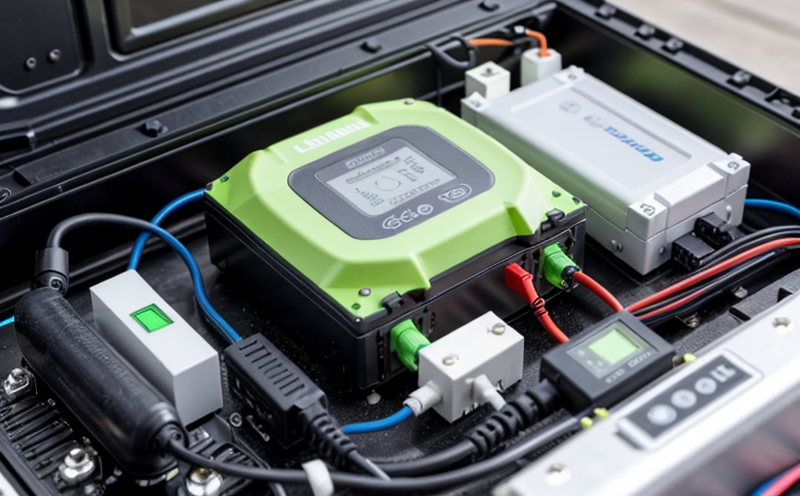UNE EN 62660-2 Lithium-Ion Cell Testing for EV Applications
The UNE EN 62660-2 standard is a critical framework in the global automotive and transportation sectors, specifically targeting the safety and performance of lithium-ion cells intended for electric vehicle (EV) applications. This standard ensures that battery cells meet stringent requirements to ensure reliability and longevity under various operating conditions.
Lithium-ion batteries are at the heart of electric vehicles due to their high energy density and low self-discharge rates, making them highly efficient in storing large amounts of electricity. However, they also pose unique challenges for safety considerations. UNE EN 62660-2 addresses these concerns by specifying a series of tests aimed at ensuring that lithium-ion cells are safe under different conditions.
The standard covers various types of tests including thermal stability testing, mechanical impact resistance, electrical overcurrent protection, and more. These tests are essential for verifying the safety margins and performance capabilities of lithium-ion cells used in EVs. Compliance with this standard not only enhances consumer confidence but also ensures regulatory compliance across different markets.
The process involves detailed preparation steps where each step is meticulously documented. Specimen preparation includes ensuring that the cell is free from any defects or irregularities, which could potentially affect the outcome of the tests. Once prepared, cells undergo rigorous testing using specialized equipment capable of simulating real-world scenarios experienced by EV batteries.
Our laboratory adheres strictly to international standards such as UNE EN 62660-2 for all our lithium-ion cell test procedures. This ensures that every result we provide is accurate and reliable, giving our clients peace of mind regarding the quality and safety of their products.
The importance of this standard cannot be overstated in today's rapidly evolving automotive industry. As electric vehicles become more prevalent on roads worldwide, ensuring the highest levels of safety must remain a priority for manufacturers. By adhering to UNE EN 62660-2, we contribute significantly towards achieving this goal.
In summary, compliance with UNE EN 62660-2 is crucial not just for meeting regulatory requirements but also for enhancing brand reputation and consumer trust in electric vehicles powered by lithium-ion cells. Our comprehensive testing services ensure that your products meet these stringent standards and perform optimally under real-world conditions.
Why Choose This Test
Selecting UNE EN 62660-2 Lithium-Ion Cell Testing for EV Applications is a wise decision due to several compelling reasons. Firstly, it provides an additional layer of assurance that your product meets the highest safety and performance standards required by regulatory bodies globally.
Secondly, this testing process helps identify potential issues early in development stages, allowing manufacturers to address them before mass production begins. This proactive approach can save significant time and cost while improving overall product quality.
Thirdly, adhering to international standards like UNE EN 62660-2 enhances brand reputation significantly among consumers who increasingly demand environmentally friendly technologies. It demonstrates a commitment to safety and sustainability that resonates well with eco-conscious buyers.
Last but not least, choosing this test can expedite market entry for new products by ensuring compliance with stringent regulatory requirements early on in the development cycle. This reduces the risk of delays caused by non-compliance during late stages of production or even after launch.
These advantages make UNE EN 62660-2 Lithium-Ion Cell Testing indispensable for any organization involved in designing, manufacturing, or distributing lithium-ion cells intended for electric vehicle applications. By investing in this service now, you are positioning yourself ahead of competitors and setting a benchmark for excellence.
Customer Impact and Satisfaction
The implementation of UNE EN 62660-2 Lithium-Ion Cell Testing has direct benefits on customer satisfaction and loyalty. When customers know that the products they buy have undergone rigorous testing according to international standards, it instills confidence in their choice.
For quality managers and compliance officers within organizations, this means peace of mind knowing that their products meet stringent safety criteria. This can lead to better decision-making processes regarding product development and marketing strategies aimed at maintaining high standards.
R&D engineers benefit greatly from such testing as it provides valuable feedback which can be used to improve future generations of batteries. They gain insights into how cells behave under different conditions, helping them optimize designs for maximum performance while minimizing risks.
Procurement teams also see significant advantages since they can rely on consistent quality and reliability when sourcing components or raw materials needed for battery manufacturing processes. This leads to more efficient supply chain management practices resulting in cost savings throughout the entire lifecycle of a product.
In essence, UNE EN 62660-2 Lithium-Ion Cell Testing contributes positively towards enhancing customer satisfaction by ensuring that end-users receive safe, high-quality products that perform as expected. This aligns perfectly with our mission to deliver exceptional service and support for all our clients.
International Acceptance and Recognition
The acceptance and recognition of UNE EN 62660-2 Lithium-Ion Cell Testing extend far beyond national boundaries, making it a widely adopted standard across numerous countries. Its international relevance stems from its alignment with global regulatory frameworks governing electric vehicle safety.
Many governments worldwide have incorporated this standard into their national standards or regulations, ensuring that all lithium-ion cells intended for EV applications comply with the same high standards wherever they are manufactured or sold.
This harmonization of testing protocols fosters international cooperation and mutual trust among stakeholders involved in the electric vehicle industry. It facilitates seamless trade between different regions by reducing barriers related to differing technical requirements.
Moreover, recognition from reputable bodies like ISO (International Organization for Standardization) further reinforces its credibility. Such endorsement highlights that this standard sets a benchmark for excellence within the sector and serves as a guiding principle for best practices globally.
The widespread adoption of UNE EN 62660-2 Lithium-Ion Cell Testing underscores its importance in maintaining consistent quality standards across diverse markets. This ensures that consumers everywhere can enjoy safe, reliable electric vehicles powered by lithium-ion cells tested to the highest international specifications.





